In a heartfelt conversation with The Ukrainian Week, the mother of Danylo Sychov, who tragically perished in Donbas, shares memories of her son, his unwavering beliefs, and the dream that now guides her back to life.
***
A lamp burns on Daniel’s grave, lit by his mother, Tetiana, who visits her son daily. She shares her thoughts with him, feeling his invisible support. She knows that her Danya lives on in the hearts of those he loved. And that the Victory he dreamed of, believed in, and so selflessly fought for will surely come.
Danylo wrote poetry and was passionate about photography. He earned a law degree and worked as a barista. He delighted his loved ones and friends with delicious coffee, giving them moments of joy. He helped those in need, loved people, and cherished this world. His dream was to open his own café. However, on February 24, 2022, when the first explosions of Russian bombs and missiles shattered the peace of his hometown, Mariupol, Danylo did not hesitate to stand up in defence of his city and country. Tragically, on September 12, 2023, Danylo Sychov lost his life in battle near Andriivka in the Donetsk region. He was only 23 years old.
It was not until November that his family could bid farewell to the warrior on his final journey. He now rests at the military cemetery in Zhytomyr, among his brothers-in-arms who fell while defending Ukraine’s freedom and independence.
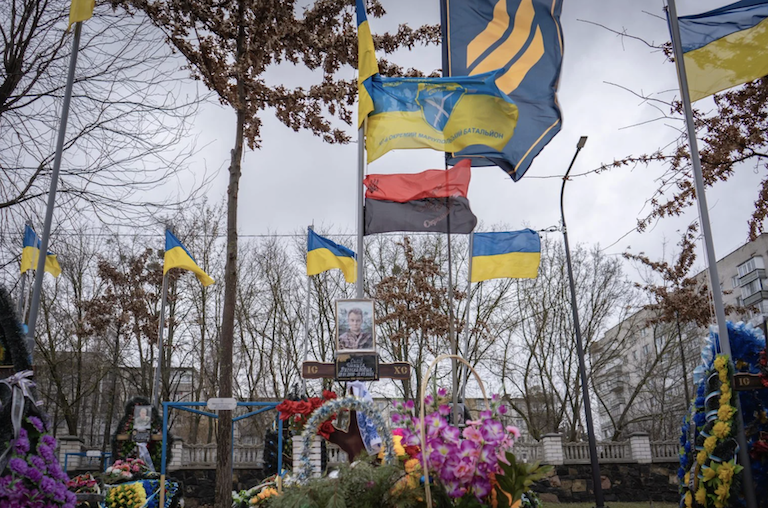
“I am from the Zhytomyr region. After graduating from school, I went to study in Kharkiv, and later settled and worked in Mariupol for 42 years,” shares Tetiana, Danylo’s mother. “It was there that I met my future husband. We got married, blessed with three wonderful sons and two daughters. We now have five grandchildren. We were a happy family, living peacefully in our city until the Russian war came.”
“Our eldest son, Ihor, devoted himself to helping those in need from a young age—the poor, orphans, and the homeless,” Tetiana reminisces. “After reading the story of St. Francis of Assisi, he felt called to follow in his footsteps. Ihor studied at the seminary and eventually became ordained as a Catholic priest. During his studies, he took a break for four years—when the war in the Donbas began, he volunteered and fought in the ATO. He once said to me, ‘Mother, there is a war in our homeland. Someone from our family must go and defend Ukraine.'”
“The middle son, Volodya, has always had a heart for caring for others,” Tetiana fondly recalls. “He dreamed of having a large family, but when he got married, they didn’t have children for 12 years. During that time, they dedicated themselves to caring for orphaned children and working in a Christian school. Eventually, they became foster parents to 8 children in a family-style children’s home. And then came the ninth—a little girl they adopted as their own. She was a complete orphan, her mother passing away when Oksana was just 4 years old, and her father killed during the first shelling of Zhytomyr in February 2022.”
“Our eldest daughter now resides in Slovakia with her children; they left at the onset of the Russian invasion. The youngest, Lyuda, also went to Poland with her daughter Lizochka, but they eventually returned. Currently, they reside with us here in Zhytomyr. And our youngest son, Daniyil, from the very first hours of the war, stood up to defend his homeland,” Tetiana recounts with pride.
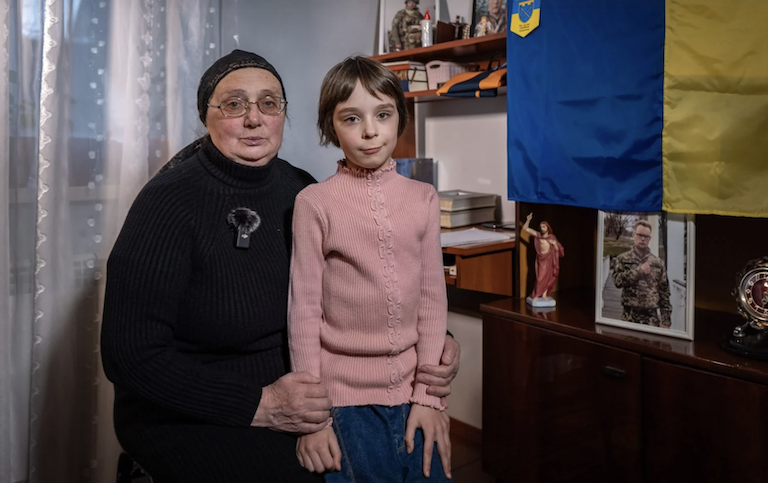
– How do you remember those first hours of the war in Mariupol?
– How can I put it into words? When a rocket streaks across the sky, crashing just a hundred meters away, and you witness from your window the glow of burning buildings? The dawn of February 24 transformed abruptly into a living nightmare… We resided near the Azovstal plant, right next to the military base of Ukraine’s Azov regiment. Explosions echoed, and fires raged on all sides. It was pure terror. Events unfolded at a dizzying pace, too fast to comprehend. We sought refuge from the relentless shelling in the cellar, in a concrete pit once used for storing potatoes. Alongside us was a boy named Danya, who had disabilities. He couldn’t move, bedridden yet tall and resilient. Unable to transport him to safety, we huddled together in that cold pit for ten agonising days. The windows of our home were blown to pieces, bomb craters littering the landscape, and the ground trembling with each explosion. But by some miracle, God watched over us. Eventually, a familiar priest came to our aid, guiding us to the safety of the church basement in the heart of Mariupol. There, we witnessed it all.
We witnessed Russian bombs raining down, obliterating entire buildings; bodies were charred beyond recognition. People sought refuge in our basement, recounting tales of relentless bombardment by Russian planes, fires raging uncontrollably… Yes, the Lord watched over us. Everything around us burned to ashes; only a small portion of the building above our basement survived. We endured 50 harrowing days of Russian occupation in Mariupol. Somehow, we made it through. We underwent Russian filtration: a terrifying ordeal. Filth was everywhere; the sick were lying on mattresses, unable to move… The disabled, the maimed… There were young Ukrainian men, subjected to humiliating “loyalty checks” by the Russian occupiers; they were tormented in the basements. All of this unfolded right before our eyes. It’s a tale that could fill volumes, unbearable to recount. Our city, once vibrant, now lies in ruins. But amidst it all, my fear wasn’t for myself. My deepest concern, in those dark days, was for my son, for our Danya.
– Tetiana, you mentioned that Danylo went to the military enlistment office on the first day of the war.
– Yes, in the last few months before the start of the Russian invasion, Danylo was working at Azovstal. He happened to be on the night shift that fateful day. He called at dawn: “Mum, pack my things in Igor’s backpack, and let Dad bring them to me at the entrance. I’m going to the military enlistment office.” “How? Why, son?” “It’s war, Mum.”
He had never been in the military before and never held a weapon in his hands. He had only shot at the shooting range before, quite accurately. But it’s that youthful enthusiasm, like in most boys. I cried, and I begged, ‘My dear son, why are you going? Stay, you’re not a soldier.’ He went. But you know… When my son died, I started reading his messages on the phone. I think he’s not mad at me. Moreover, these messages are friendly and businesslike; he didn’t have a girlfriend. Here, I am reading his conversation with his friend. He’s also Danylo, five years younger than my son, an orphan. My Danylo took care of him, helped him get out of Mariupol, and then helped him move to Germany and settle there. He also wanted to bring his parents there, but it didn’t work out.
And then I read this younger Danylo writing to my son, who had just started serving in the 3rd Assault Brigade: “You’re so brave; you probably look down on us now for fleeing, for not fighting. But you know, everyone has the right to choose; not everyone can fight…” And it struck me when I read my son’s reply: “You know, Danylo… You can choose your friends and a girlfriend, decide to get married or not, and start your own family or not. In the end, everyone chooses whether to believe in God or not. But when enemies come to your city to destroy it, to kill your loved ones, you have no choice. I had to go to protect them.”
It’s very difficult to read these lines. (Tetiana is crying). I’m discovering a new side of my child now as I read through his poems and essays and admire his photography.
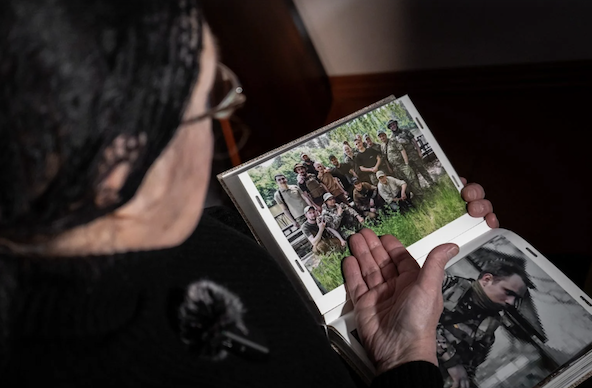
– What was he like?
– Danya came into this world when I was 40 years old. It was a challenging pregnancy and a complicated delivery. He was a hyperactive child, you know, like our ‘little engine’. Our neighbour used to laugh and tell me: “Your boy has three batteries that are always fully charged.” He didn’t walk; he ran. He didn’t ride his bike – he zoomed on it. He always had scratches; we were constantly going to the pediatric surgery department to have something stitched up after his little adventures. He was incredibly active. Once, when the teacher asked for help in class to hang curtains on the windows, after finishing the task, he wouldn’t just jump down from the windowsill – he had to do a somersault. He loved making friends. With his older brother, Ihor, they were like two peas in a pod, kindred spirits. He would share children’s secrets and little poems with Ihor. Danylo was very sensitive. He abhorred evil. When I read him the tale of Kolobok [fairy-tale featuring a small yellow spherical bread-like being – ed.], he would say: “Stop, don’t say that! Kolobok is good; it’s the fox that’s evil. Chase her away!” I was amazed because I had read this tale to many kids, and none reacted to the plot as he did.
As he grew older, he and Ihor read Tolkien’s books together. Danylo would always say the same thing: “Stop, don’t continue. I can’t believe this can happen. Good people should live.” He was deeply moved and cried bitterly for every positive hero who perished.
Sometimes, it seemed to me that he wasn’t seeking the kind of friends I had envisioned for him. But then I realised that this was how he reached out to people who were often overlooked in this world: the forsaken, those without parents. It became clear to me when Danylo turned 21. Now, as I read through his correspondence, I am astounded by the number of good deeds my child managed to accomplish in his brief life. It’s not easy to discuss, but… After his passing, we discovered a handwritten note from him in which he pleaded to care for his friends. “If you are reading this, it means I am gone. Please, do not forget to help these people; I entrust you to remember this child…”. Some of them were ill, some very young and lonely, and even after his demise, he cared for them.
When he found out that the parents of his friends couldn’t be evacuated from Mariupol and were in dire need, he found ways to send his own funds to them so they could buy food. But he always insisted on telling them that the money was from their grandson or granddaughter.
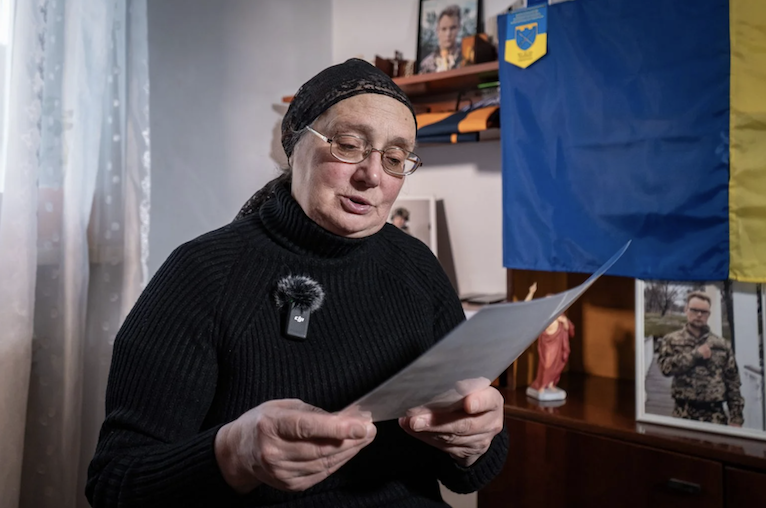
I read through the narrative of my son’s life, and it’s truly astonishing. When I come to his grave, I say, “Son, I didn’t know you as you truly were. I didn’t comprehend the depth of your heart, the profound thoughts embedded in your works, and the love you shared with people.”
His fellow fighters, all older, each referred to him as “my younger brother Danya.” He began his service in the Mariupol Battalion and then joined its larger part in the Bahmut Territorial Defence. Both battalions cherished Danya. He had a knack for diving into other people’s troubles. If he noticed a difficult situation, he wouldn’t hesitate to call a comrade’s wife and ask her to speak to her husband. He had a way of uplifting words for his comrades. He always remembered everyone’s birthdays. The female soldiers who served alongside Danya would find little bouquets of flowers on their pillows. They tell me about it now, saying, “He was the heart of the group.”
– Did he dream of having his own coffee shop?
– Yes, that was his passion. He worked at a coffee shop – first in Boyarka, in the Kyiv region, while studying in Kyiv. It was actually the first coffee shop I ever visited in my life. I wasn’t quite accustomed to such places; I was always preoccupied with household chores, kids, and work. But Danya would insist, “Mom, come on, it’s really lovely there; you’ll enjoy it.” He’d always make me a cappuccino, sometimes with a heart or a little flower on top as decoration.
When he returned to Mariupol, he continued working as a barista. He once shared with me his dream of owning his own coffee shop. By then, I was eager to support my son. However, we didn’t have enough money; his salary was modest. So he went to work at the plant [Azovstal metallurgical facility located in Mariupol—ed.], aiming to save up for his own business.
Now, I ponder how we’ll make Danya’s dream a reality. I’m not entirely sure yet, but it will be a coffee shop—a warm and inviting place where those in need of support can gather—veterans of war and those seeking kindred spirits. That was our son—always wanting to embrace everyone. I want his dream to come true, to continue helping others as he did.
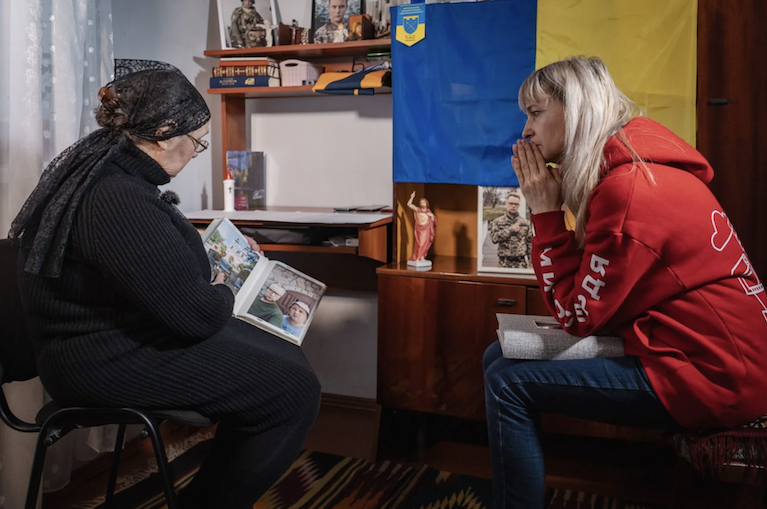
I want to express my gratitude to those who supported us in our darkest hour. Here in Zhytomyr, where we sought refuge from the Russian horrors in Mariupol, the kind Smirnov family opened their home to us, and we still reside there completely rent-free. I am especially thankful to the Religious Mission of Caritas-Spes Ukraine and Caritas Poland for their invaluable assistance. The support we received through the “Family to Family” project was truly a lifeline for us. We fled Mariupol with nothing. We fled, taking nothing with us, with nowhere to turn and not a penny to our names. I remember asking my son, “Where do we go from here? What are we going to do?” We were left with nothing—no clothes, no shelter, no resources. But the Lord guided us and protected us through the kindness of these good-hearted individuals. For God always works through the hands of compassionate people.
– It’s been two years since the war started, two years of Ukraine fighting for its right to independence. How do you feel about it all?
– War is truly terrifying. It ravages homes and cities and takes away precious human lives. It wipes out entire generations of people yet to be born. Over at the cemetery where my son rests, there are young boys who were just 17 and 18 years old. I counted, and nearly 75 per cent of those who lost their lives were under 30 years old. These were children, young adults who went off to fight, never getting the chance to have their own families. They were the generation that was meant to shape a new future. And now, as we see it, some of our best and brightest are gone. Perhaps they laid the groundwork for our eventual victory. And that thought is what gives us strength to carry on.
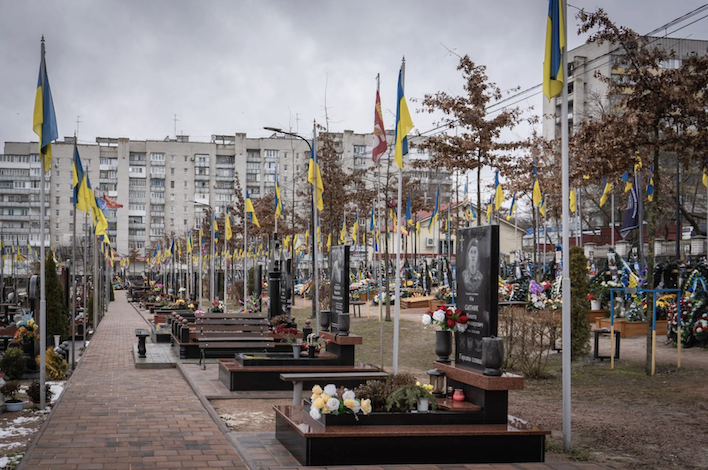
Danya was a remarkable soldier; a courageous one. It was in August 2023, during one of the battles, that he was wounded, his uniform catching fire. He never mentioned a word about the injury to us. He simply asked for help in gathering funds for a new military uniform. Usually, he was the one aiding others, but this time, he reached out for help. And just before that final assault near Andriivka, he managed to obtain that new uniform… On September 10, he sent us a photo in that new attire. I look at that picture… And then he was struck in the head. Death likely came instantly. I want to believe he felt no pain and realised nothing… We could only retrieve our son’s body on the 50th day after his passing.
You know, I’ve always been a pacifist at heart. My son, through his life and deeds, showed me that evil must be confronted. I am deeply religious. I can’t recall which day it was after Danya’s death, but I went to the Cathedral of Saint Sophia in Zhytomyr, lit candles, and prayed. It was a routine I followed, just like always.
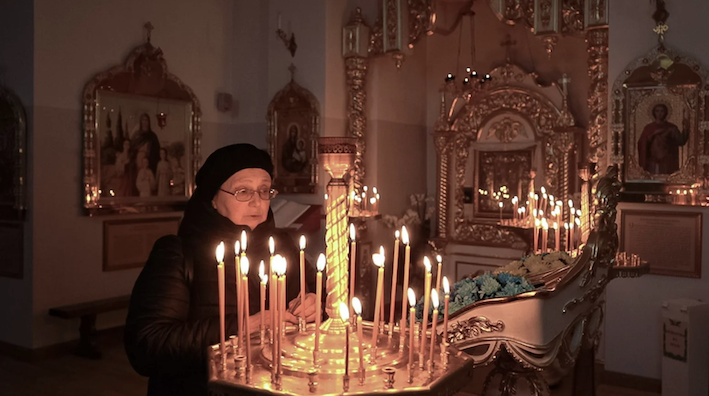
And then, I lit a candle for the soul of the person who killed my son. I thought I wouldn’t be able to do it. It happened involuntarily. And when I did it, I felt a great relief wash over me. I prayed for that soul. Then I bought another candle – I lit it for the Russians, asking them to repent, and prayed to God for an end to the war. After that, I went to the photo studio and printed a portrait of Danya, where he was smiling. And when I got home, I donated a significant sum for sniper rifles. In my thoughts, I addressed the enemies – guys, I pray for your souls. But if you don’t want to leave us in peace and go back home peacefully, then… My son said at the beginning of the war: we will defend ourselves. And we will carry on his mission, defending our land for as long as we live.
***
The sea of forgotten sorrow,
At the edge of the world, it lies,
A city of factories and grey smoke,
Where life passes by.
Amidst streets, ghostly, silent,
Shrouded in mist, they stand,
Without sleep, without sleep,
In this distant, unknown land.
Soaring like a seagull in the sky,
Whispering in the chimneys tall,
I gaze from a free cage,
Into the vast celestial sprawl.
Beyond the sea, beyond the field,
My heart and thoughts unfurled,
Yet here I remain in this world,
A poem by Danylo Sychov.

